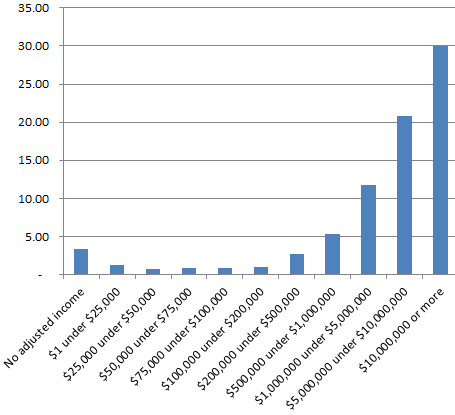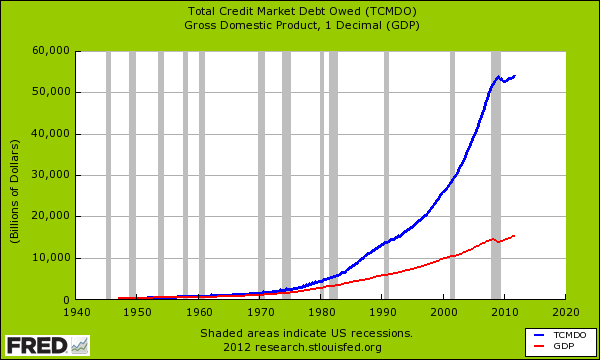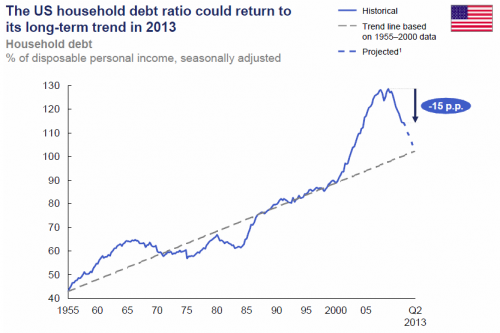...30 percent of those with incomes above $10 million audited.
Posted by mybudget360
Now that tax seasons is mostly finished for your average American
and people can exhale and take a breather, some interesting data is
released by the IRS. Audit data is fascinating because it highlights
that in terms of those getting an audit, the more you make the more
likely you are to be audited.
It is useful to get a sense of how this
plays out. The IRS is unlikely to audit the average American making
$25,000 a year because in reality, the cost and return of going after
this group is so minimal. As the famous bank robber Willie Sutton once
replied to a reporter as to why he robbed banks, “because that’s where
the money is.”
The government is running lean and as many of you know,
carrying over a $15 trillion in public debt
is starting to become a burden. Debt ceiling talks are already out in
the open as if we are already preemptively ready to spend more money we
don’t have. Ultimately all Americans will need to shoulder some piece
of this debt via cuts or tax increases and that is the painful reality.
IRS audit data
The IRS data is fascinating in terms of where they focus the large portion of their audits:
You’ll notice that once a $200,000 income is hit, the risk of being
audited increases. I also found it interesting that those reporting no
adjusted income had a higher chance of being audited than those who made
between $25,000 and $500,000. This is probably another group that will
show up on the radar. However, those with incomes of $10 million or
more have a 30 percent chance of being audited. Yet as we know many
Americans are simply struggling to get by with a per capita income of $25,000. Our total credit market debt is simply off the charts and over three times annual GDP:
Some serious challenges are coming online in the near future:
-1. Unemployment benefits are phasing out and expiring for many
-2. 2001 and 2003 tax cuts set to expire
-3. The debt limit will be reached again by the end of the year
-4. Payroll tax cut will expire and increase from 4.2% to 6.2%
-5. AMT will drop from $74,000 or higher to $45,000 or higher. This will make it harder for middle class families to use deduction in effect creating a tax increase
Many purists would argue that we either go full on tax increases or
full on cuts. The reality is, the economy is incredibly weak. Most of
the economy is still fueled by subsidies via home owner mortgage
interest deductions, bailout funds to banks, government backed student
loans, food stamps,
and unemployment insurance. In other words, transfer payments are
holding many people from full on economic disaster. For example, 1 out of 3 retirees relies on Social Security for most of their post-work income.
The fact of the matter is we need a combination of both cuts and
revenues to simply pull back from the approaching abyss. Yet Congress
is a mess of dysfunction and can’t accomplish anything except collect
large salaries for their six-figure pontifications. Households have
been in the process of de-leveraging for some time now:
In other words, most Americans are already doing their part in this
austerity process. Many have less access to debt, have seen no wage
increases, and have seen their largest asset in housing collapse.
The problem of course is that this shared sacrifice is being largely
being pushed on the backs of working and middle class Americans. How
many have the luxury (or even desire) to renounce their citizenship just
to avoid taxes? The chart above highlights that most of this austerity
push has been at the expense of the many.
Outsized gains are flowing to the financial sector that is largely responsible for this economic calamity. Just recently JP Morgan Chase had a $2 billion gamble
loss in their trading unit. This bank which should be operating as a
retail banks is still running like a hedge fund in parts of its
business. Bring back Glass-Steagall.
The IRS data is also telling in the sense that all Americans will
feel the pangs of dealing with this massive amount of debt. It is
unavoidable. Yet when you dig deep, it is unlikely to be paid back by
the 46,000,000 on food stamps or the 1 out of 3 retirees on Social Security fully dependent on it for their income. The young? Those under 35 have a median net worth of $3,500 and many are in massive debt. You start running out of places to look for money. Who will pay for this debt? In the end, it will be the entire country. Source: mybudget360


